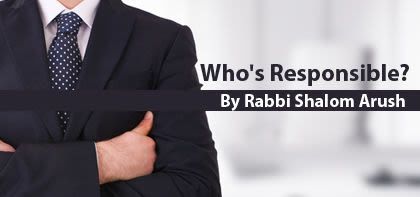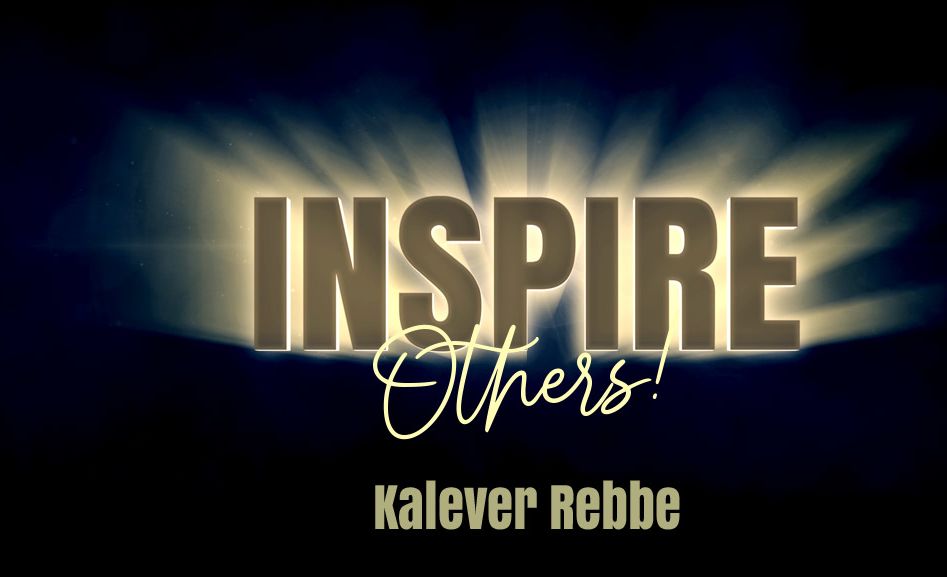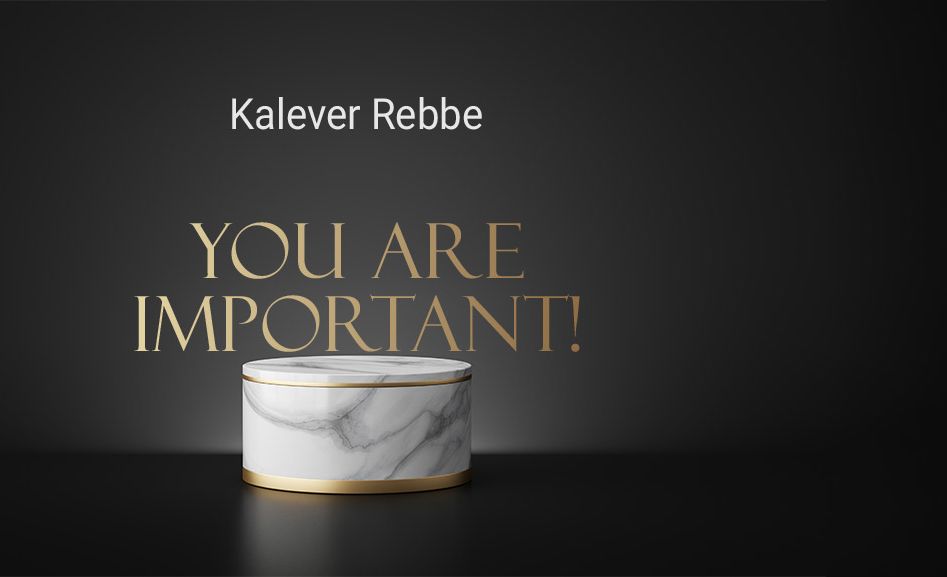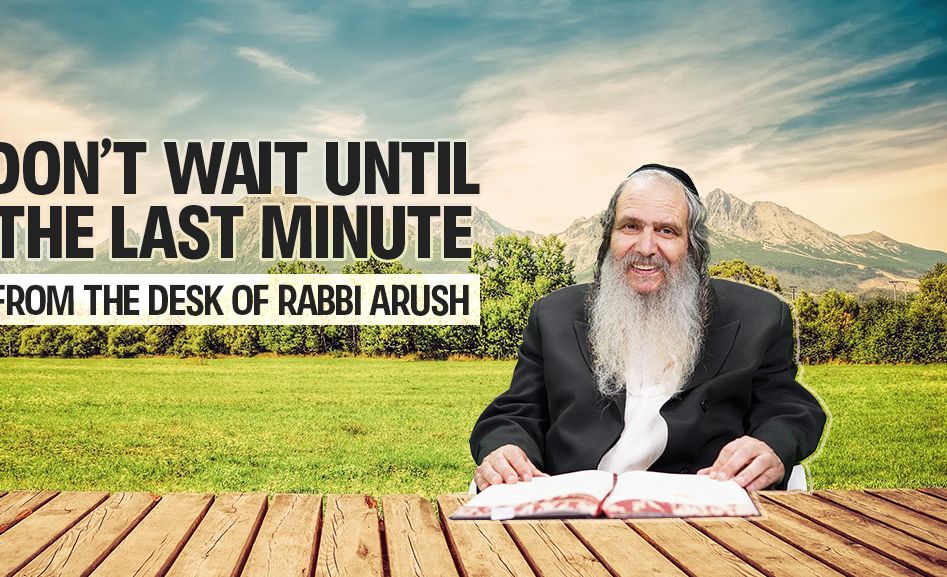
Who’s Responsible?
Since everything comes from Hashem, including the Evil Inclination, can we blame Hashem for our sins? Why must we do teshuva at all? Who's really responsible?

Translated by Rabbi Lazer Brody
Does that fact that Hashem in effect takes responsibility for our transgressions absolve us of the need to pray and do teshuva in preparation of the High Holidays? Of course, not! But how can we say that Hashem takes responsibility in the first place?
Look at the following passages from Tanach:
The prophet Micah says, “On that day – the word of Hashem – I will pick up the lame and gather the outcast and whomever I have harmed” (Micah 4:6). Hashem is promising that in the future, He will gather all of the Children of Israel from all their exiles and will bring them to perfection, for He caused them to sin by giving them an evil inclination. The prophet Jeremiah says, “As clay in the hand of the potter, so are you in my hand, O House of Israel” (Jeremiah 18:6). Hashem is telling us that just as a potter can mold the clay any way he wishes, so He can do with us. In effect, this is Hashem’s admission that if a person falters, then Hashem  caused it. A third prophetic passage says, “I shall remove the heart of stone from their flesh and I will give them a heart of flesh” (Ezekiel 36:26). Hashem holds Himself responsible for the heart of stone that makes people sin, and when He decides to remove it, He has the power to do so.
caused it. A third prophetic passage says, “I shall remove the heart of stone from their flesh and I will give them a heart of flesh” (Ezekiel 36:26). Hashem holds Himself responsible for the heart of stone that makes people sin, and when He decides to remove it, He has the power to do so.
The above prophetic passages demonstrate that Hashem is assuming responsibility for anything detrimental in the world. He does with us whatever He wants whenever He wants. He can replace our heart of stone with a heart of flesh. These passages are not an absolution of responsibility on our part, but a powerful stimulus to pray, for if Hashem can do whatever He wants whenever He wants, we should be begging Him to lead us on the path of righteousness and to help us pray incessantly.
The question still hovers over our heads: Hashem instilled an evil inclination in each of us, a power to transgress. Why did He do it? This too is for the very best, like everything else Hashem does, for without equal inclinations toward good and evil, there cannot be free choice. Without free choice, there is no context for reward and punishment.
If people would naturally gravitate toward emuna and prayer just as they naturally gravitate toward logic and intellectual prowess, then the evil inclination would be stripped of its power over man. But, since the light of emuna and prayer are not in demand, a person’s key test in this generation is to strengthen himself in emuna and prayer while putting his logic aside.
The entire act of creation is a deep parable that reveals something of The Creator’s intent in everything He did. The Creator provides us with two paths, although He personally recommends that we choose the path of good. In the words of Lamentations (3:38), “Is it not from the mouth of the Most High that evil and good emanate?” In other words, Hashem sends simple Divine light to the world, and each person – according to the spiritual vessels that he or she prepares – channels this “light” (or power) to good or evil. Accordingly, “Of what shall a living man complain? A man for his sins!” (ibid, 39).
If a person has complaints about life, then let him complain about his own sins rather than blaming Hashem for his difficulties in life. For example, rather than a heavy cigarette smoker complain to Hashem for his chronic cough and shortness of breath, let him change his ways and stop smoking! Accordingly, each individual must thoroughly assess himself, “Let us search and examine our ways and return to Hashem…we have transgressed and rebelled” (ibid, 40-42).
Rebbe Nachman stresses (Likutei Moharan II:54), “One has free choice to do as he pleases, even anything, for every Israelite has the power to act according to his own choice… others might be coerced in certain areas, but the Israelite has free choice in everything he does.” We are therefore bear sole responsibility for our own actions.
Even though Hashem defends us according the the prophecies we cited earlier, and the great tzaddikim also plead in our behalf in like fashion, especially on Rosh Hashanah, we should not be so insolent as to blame our wrongdoing on Hashem. Each person must assume responsibility for his own actions.
Consequently, if we desire to complete our mission on earth in the best possible way, we must incorporate prayer in our lives – the more the better. Prayer creates the necessary spiritual vessels for Divine abundance, both spiritual and material. Our free choice is by virtue of the diminishing of the moon. But, the more we choose prayer, the less we choose evil and the less we desire to choose evil, for prayer enhances emuna. With strong emuna, a person’s sole goal is to gratify Hashem.
Once the spiritual awareness of the value of prayer and emuna becomes widespread in the world, then, “The light of the moon will be like the light of the sun” (Isaiah 30:26). Just as the light of the moon will be like the light of the sun, so too the light of emuna will be just as apparent as the light of intellect. This is the light of redemption, where Hashem cures the ills of His people, speedily during this new year, amen!







Tell us what you think!
Thank you for your comment!
It will be published after approval by the Editor.